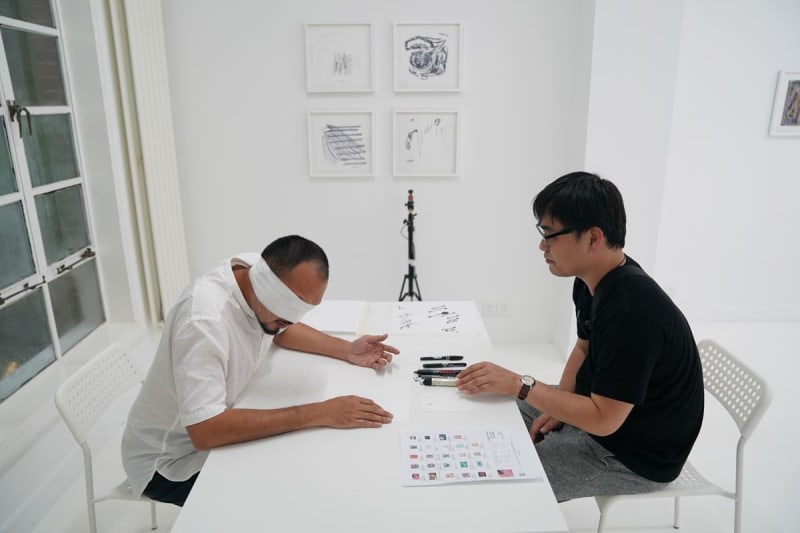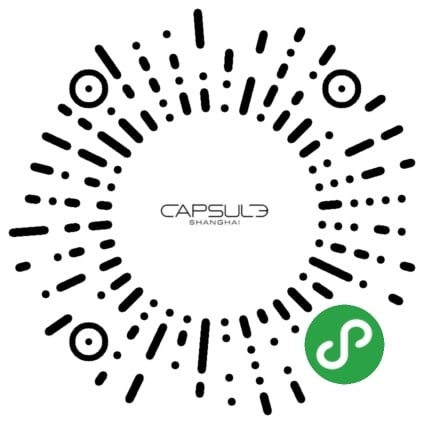A core theme running through River Lin's artistic practice is the staging of healing rituals. In Kiss it Better (2015), for example, Lin asks members of the audience to indicate where they have experienced pain, to which he responds by drinking the crimson antiseptic merbromin and kissing the area of hurt.
In these one-on-one performances, intimate moments of exchange and transference are enacted with conscious care. Bone Setting Service (2018), for example, staged as part of Tempting Failure - London's Biennial of International Performance Art and Noise (9-22 July 2018), involves participants lying down on paper so the artist can trace their outline before they mark out sites of discomfort on the drawing. At once a performance of healing and cultural translation, Lin then connects these points to the Chinese meridian system, through which 'chi' or life energy flows, and provides a massage of realignment.
Art historical references are often infused into Lin's compositions. An early performance work, River Walk (2014), engages with the embodied practice of ink painting, with Lin translating the delicate balance between water, ink, and hand by slowly moving through a demarcated frame filled with flour, through which his movements leave expressive yet considered trails, like a brush to the page.
While 20 Minutes for the 20th Century, but Asian (2016) translates Tino Sehgal's performance Twenty Minutes for the Twentieth Century (1999), a choreography that samples signature movements from the likes of Martha Graham, Pina Bausch, and Trisha Brown. Lin's version, produced in collaboration with Taiwanese dancer Wen-Chung Lin, expands the composition by adding references like Chinese folk dance, classical ballet, and yoga.
20 Minutes for the 20th Century, but Asian, Lin says, is not so much a critique as it is a challenge-a reflection of how history often omits the influences of others from dominant discourses. The performance, video, photography and installation work Huxian Memorial Hall (2019) also responds to historical omissions, this time paying tribute to LGBTQ figures and activists from across Asia in the 20th Century and today, from Wong Kar Wai's muse Leslie Cheung to Freddie Mercury, who have contributed to the struggle for equal rights.
'Taiwan, in 2019, has been comparatively fortunate becoming the first Asian country to legalise same-sex marriage', Lin explained of the project. 'However, many of the LGBTQ community in Asia still suffer'.
Lin says he came to performance late-in 2011 to be exact. In 2010, he graduated with an MA in Performing Arts from National Taiwan University of Arts, and found himself somewhat alone when it came to his interest in exploring the boundaries and possibilities of live performance art. What materialised from Lin's search for community was Asia Discovers Asia Meeting for Contemporary Performance, or ADAM: an annual residency and international gathering hosted by the Taipei Performing Arts Center.
Launched in 2017 with the aim of 'fostering the exchange, development and collaboration of contemporary art and performance in the Asia Pacific region and beyond', ADAM has welcomed practitioners from across the world, including documenta 2022 artistic directors ruangrupa, actor Bunny Cadag, artist Justin Shoulder, and dancer and choreographer Chen Wu-Kang. In 2019, Chen introduced Rama's House as part of the programme: a three-year collaboration with Thai choreographer, Pichet Klunchun, exploring the traces of the epic Ramayana in dance forms across Southeast Asia, which saw them connect with dance masters from Indonesia, Myanmar, Cambodia, and Thailand. ADAM's fourth edition, An Internet of Things, was staged online from 12 to 16 August due to travel restrictions around the Covid-19 pandemic.
© Ocula


